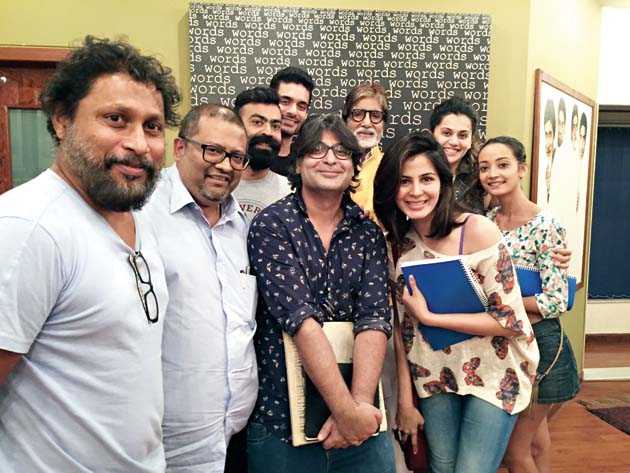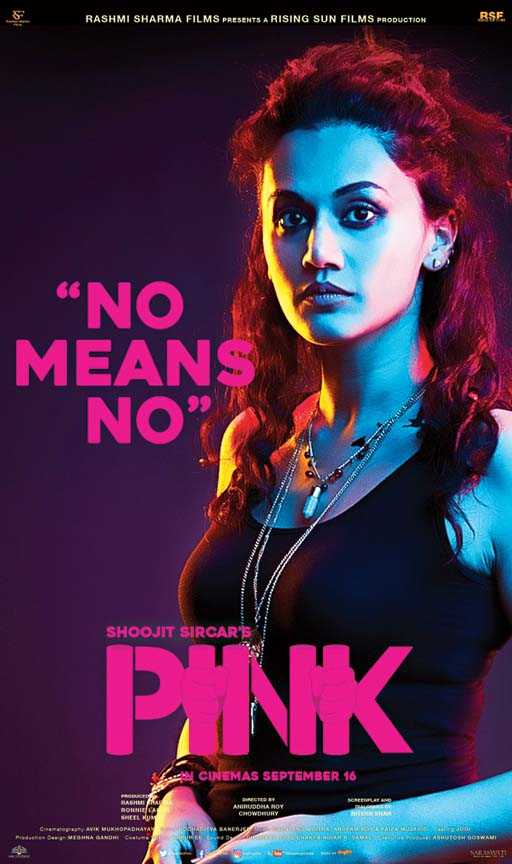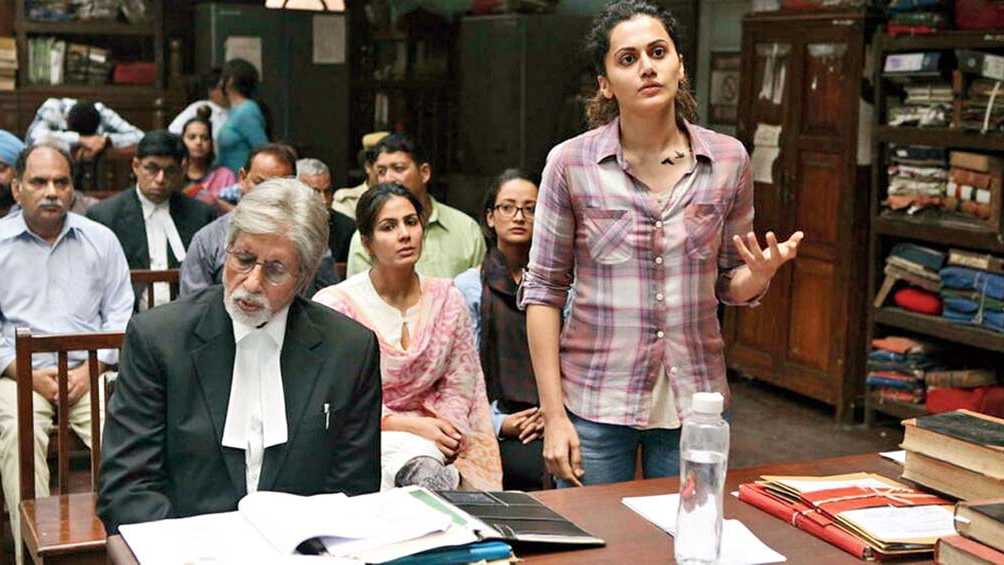Five years ago today, there came a film that made its audience uncomfortable, but also empowered them in more ways than one. Pink, a film which spoke about every woman’s fundamental right to say ‘No’ and also lifted the lid off prejudices that women collectively and individually face, not only spurred off conversations but quickly became a movement.
Opening to unanimously positive reviews, Pink — that marked the Bollywood directorial debut of Kolkata’s very own Aniruddha Roy Chowdhury, better known as Tony — earned huge box-office, powered by some remarkable performances from its strong ensemble cast led by Amitabh Bachchan and comprising Taapsee Pannu, Kirti Kulhari, Andrea Tariang, Angad Bedi, Vijay Varma, Piyush Mishra and Dhritiman Chaterji, among others. As the film turns five and still continues to strike a chord, The Telegraph went down memory lane with its director.
As Pink turns five, what are the emotions like?
It’s a film that cut so deep that it has become a part of my life, and a part of so many peoples’ lives. I still get messages on social media with dialogues from the film. It was a film that was our emotion, and today, it’s become the audience’s emotion. There is a very interesting anecdote that I want to share with you. A lady from Pakistan, who is a doctor, contacted me on social media and wrote such a beautiful note on the film. Pink is a film that crossed barriers. She’s now become a friend, she even met me in Bombay. Pink has become a part of society, globally. When a film of yours becomes a movement and penetrates so deep into society, then there can be no bigger joy for a film-maker.
That’s because the prejudices against women, irrespective of geographical barriers, are almost the same everywhere...
Absolutely! I have got messages from women in Sweden, London, America.... The prejudices and problems women face are the same, it’s perhaps subtle in some places and more direct in others. But it’s universal.
All of us put our hearts and souls into Pink. It was a very well-produced film. Film is a collaborative art form and this was a fantastic collaboration. A lot of the actors who came into the spotlight through Pink are now doing so well. It’s a film that changed so many lives.
When you were making the film, did you anticipate the kind of conversations it would spark off? ‘No means no’ is now a part of everyone’s vocabulary...
I had total conviction in the film, and so did Shoojit (Sircar, the film’s producer). We didn’t think so much about it being a commercial success, but I was quite convinced that the film would reach the audience’s hearts. When you have a baby, at that moment you don’t really think whether he will grow up to be a doctor or an engineer or Sachin Tendulkar (laughs). Film-making is also like that.
But we were very sure about the film we were making, and that conviction showed on screen. As film-makers, we look at making true cinema that will strike a chord with the audience... commercial success is a consequence of that.

Director Aniruddha Roy Chowdhury (second from left) with Team Pink Sourced by the correspondent
What you showed in Pink is something every woman has faced and continues to face. Pink’s success lay in the fact that it bluntly articulated what women have been experiencing all their lives. Was there a specific incident that spurred off the idea of the film?
Earlier, I would stay in Lake Gardens, below which there was a tea stall. Girls from the North-east would frequent that tea stall and I have seen people judging them based on their clothes. It would disgust me. Women partying alone at home are branded as ‘loose’. Who are we to judge anyone? It’s the kind of deep conditioning that we all are guilty of, but some of us are able to rise above that because of our awareness, education and intellect. Even women judge women.
Even my new film Lost (starring Yami Gautam Dhar) says something similar. These days, we have lost the emotion of love, the emotion of holding hands... you and I don’t need to be in a relationship to hold hands or to feel for each other. One can have a commitment towards someone you hardly know. That was there when we were kids. I still remember a lot of Sardarji drivers would be friendly with my father and come over to our house for a meal.
Now when we look back at Pink, everyone — whether it was the principal players or even the smaller parts — was perfectly cast, and we can’t really think of anyone else in those roles. Were all of them your first choices?
I first met Taapsee (Pannu, who played Minal Arora) and I knew immediately that I couldn’t find anyone better than her to play Minal. The moment I saw her I knew she was Minal. Jogi, the casting director, had screen-tested Kirti (Kulhari, who starred as Falak Ali) and she was awesome. Ronnie (Lahiri, the film’s producer) had told me about Andrea (who played Andrea Tariang), who was from Shillong. I remember seeing her from the back for the first time and she fitted the character I had in mind perfectly. I later met her in a coffee shop in Bandra (in Mumbai) and she was so profound, innocent and beautiful. Remember that lady police officer in court who interacted with Mr Bachchan? She was one of Jogi’s assistants and she was so good! Vijay Varma, Tushar (Pandey), Angad (Bedi)... I don’t think I could have got a better cast.
They are all tremendous actors. That scene where Taapsee says, ‘Kheenchke maroongi’ or when Kirti says, ‘Haan, maine paise liye hain’ or when Andrea breaks down while talking in court... all of us got goosebumps on set, so many on set were crying.
What was the process of getting Amitabh Bachchan on board?
Shoojit told me that Mr Bachchan wanted to hear the role. Ritesh (Shah, writer), Ronnie, Shoojit and I went to meet him. Shoojit explained the role to him, I told him about the politics of the film. It took Mr Bachchan only five minutes to say ‘yes’. We came out of his office and almost danced! It was Mr Bachchan’s presence that ensured that the voice of Pink... ‘no means no’ reached millions.
Did you have any title, other than Pink, for the film?
I had the title ‘No’ in mind. I also had this idea of some kind of a pink revolution in my mind. I was quite convinced about ‘No’, but Shoojit was doubtful. We were discussing about it and suddenly, Ritesh said ‘Pink’ and instantly, Shoojit also said, ‘Pink’. I had a bit of a doubt about the name because at that time I thought that pink was a feminine colour, a Barbie doll colour. But then I realised that pink stands for strength.
If you do something that is anti... whether it’s casting or whether it’s a film title, it will stick. We always think of pink as beautiful, fragile... but it also means strength, it means a shero. That worked very well for the film.
You initially intended Pink to be a Bangla film, right?
Yes. Shoojit and Ronnie had produced my Bangla film Aparajita Tumi and I had narrated the story of Pink to them while on a flight. Shoojit said that the film had to be made in Hindi. He was always very convinced about the film.
Five years down the line, what do you think the impact of Pink has been? It’s too ambitious to expect a film to change deep-rooted conditioning, but do you feel anything has changed, even minutely?
It will take time, but awareness definitely eshechhe. Not only because of the film, but largely because of social media and the way the new generation thinks. Problems, of course, still exist, but
I am very hopeful that things will change. We have to start somewhere, right? Women still face the same kind of problems, but at least I try and ensure that it doesn’t happen in my immediate surroundings.
But then, you know, I am also part of this in many ways. My wife and I come back home from work after the whole day and I invariably ask her, ‘Ektu cha khawabe?’ See, how deep-rooted our conditioning is. We need to change ourselves in small ways. It won’t happen overnight.
Have you ever thought of a follow-up to Pink?
Not right now, but I do have some ideas. Pink may actually be looked at as a follow-up to my first film Anuranan, a film that examined unnamed relationships and how quick we are to judge women. It’s a film that did very well and also won a National Award. My other films Antaheen and Aparajita Tumi also spoke about empowered women... the sur is the same in all my films. You will find that in Lost too.
‘Pink was a film that hit the nail on the head without mincing words’ — Taapsee Pannu to The Telegraph

I am often asked about the turning point in my career and I always name Pink. It is a film which is a milestone and gave direction to my career, in terms of my choices and the kind of work I wish to do. The kind of effort I have put in in every film since... I think Pink really streamlined that for me. That film gave me a sense of direction in terms of what I enjoy doing, what kind of work means a lot to me and also what my audience thinks of me. Pink defined that as well, the kind of expectations my audience has from me.
Minal Arora is going to be a very important name in my career, and maybe my life as a whole. I think Pink became a rage because it was the first of its kind... no one had spoken about such things so bluntly in mainstream cinema before Pink. It was a film that hit the nail on the head without mincing words. It spoke about things that were considered taboo... the elephant in the room, so to speak, was addressed and spoken about, very loud and clear. We ventured into doing something that we knew would hold importance, would hold value, that it would be hard-hitting and would be meaningful cinema. The film resonated so closely with so many women out there that they became responsible in making the film what it became.
